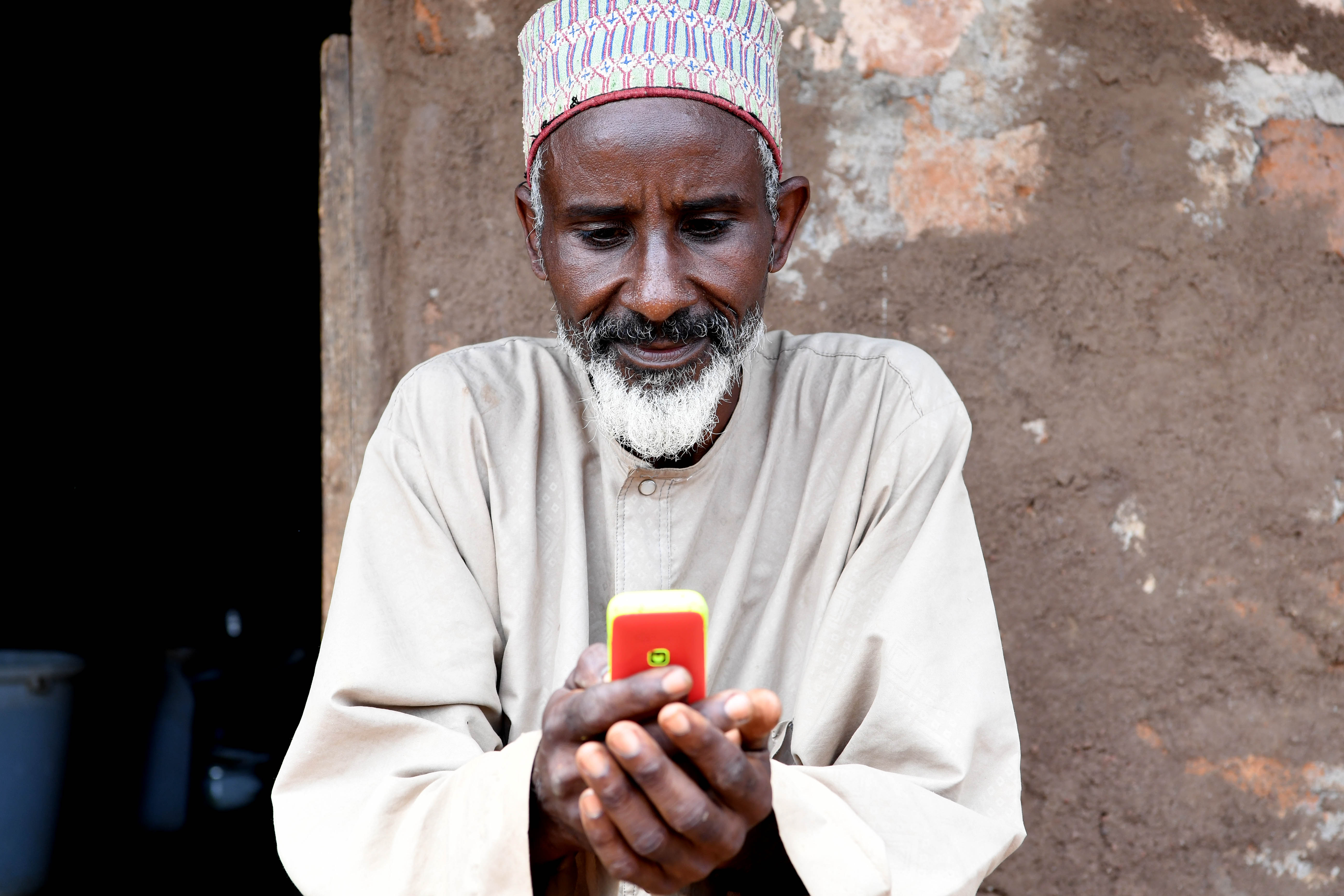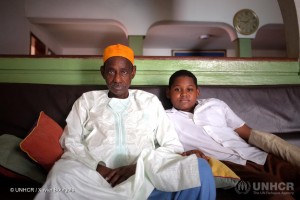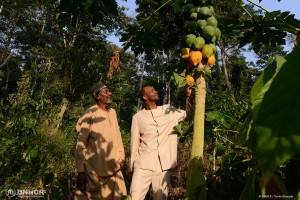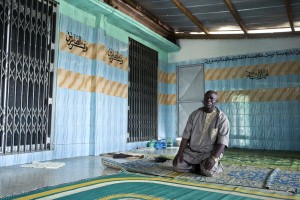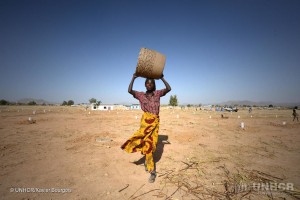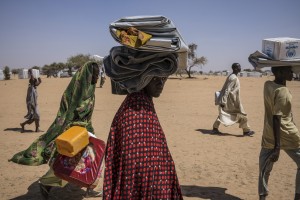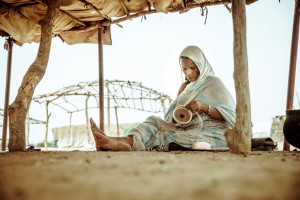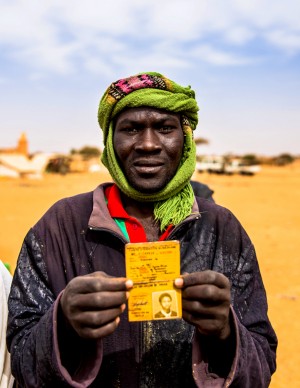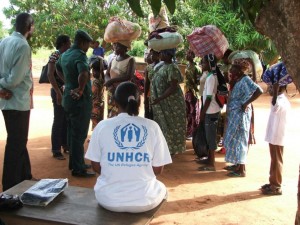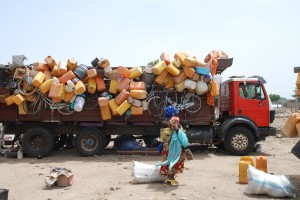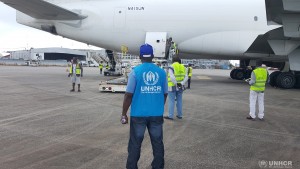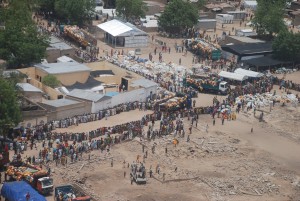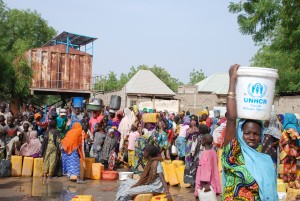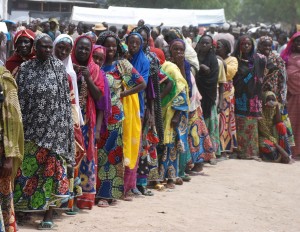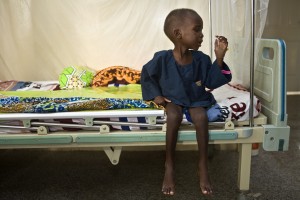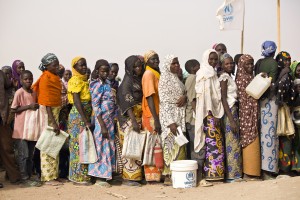After fleeing Boko Haram, a Nigerian mid-wife helps pregnant girls in Niger
Awa has become a role model to empower women and girls in a refugee camp in the Diffa region
DIFFA, NIGER, 8 March 2017 (UNHCR) – Forty-year-old Awa is an inspirational woman. A Nigerian refugee in Niger – one of the poorest countries in the world – she works as a midwife, and tries to ease the suffering of women and girls in Sayam Forage refugee camp in the Diffa region. The camp hosts 7,600 Nigerian refugees who fled Boko Haram violence in the past years. Awa’s calling was sealed when she became pregnant herself as a teenager.
“I barely remember when my first daughter came into the world. I was just fifteen years old… After more than 12 hours of labour, I could no longer take the pain. I lost consciousness when she was born. My husband and neighbours thought I was dead”. Awa was married at the age of 14 to an older man from her village she did not know. The marriage was organized by their respective families, as is common in the region. Awa insists that they are now happily married, but admits she had no say in her choice of partner, nor in decisions regarding family planning.
“We ran from the town as bullets flew over our heads, and people fell around us. We were terrified”
In 2014, Awa was forced to flee north-eastern Nigeria following a violent attack on her village by Boko Haram insurgents. “We ran from the village as bullets flew overhead and people fell around us. We were terrified. We were lucky we were together. Many others lost family members that day”. The Boko Haram conflict in the Lake Chad Basin has displaced over 2.3 million people since 2013, including around 200,000 refugees who have fled to neighbouring Cameroon, Chad and Niger. Now 40 years old, Awa has become a role model in Sayam Forage refugee camp, her home since she fled Nigeria. She spends her days in the makeshift health centre working as a volunteer midwife, helping girls and young women through labour.
March 8 is International Women’s Day and this year focuses on the theme of forging a better, more equitable working world, in which women’s right to decent work becomes a reality. Women’s Day is an opportunity to shed light on gender inequality and to highlight inspiring work being done by women worldwide such as Awa. When she arrives for work at the health centre, she is greeted warmly by a group of young pregnant women who have come for prenatal consultations. The facilities are extremely minimal, with only a few beds and a small maternity room, which consists of a single delivery bed, some basic first aid equipment and plastic sheeting for walls to protect the patients from the harsh climate and strong sun. But Awa is used to this.
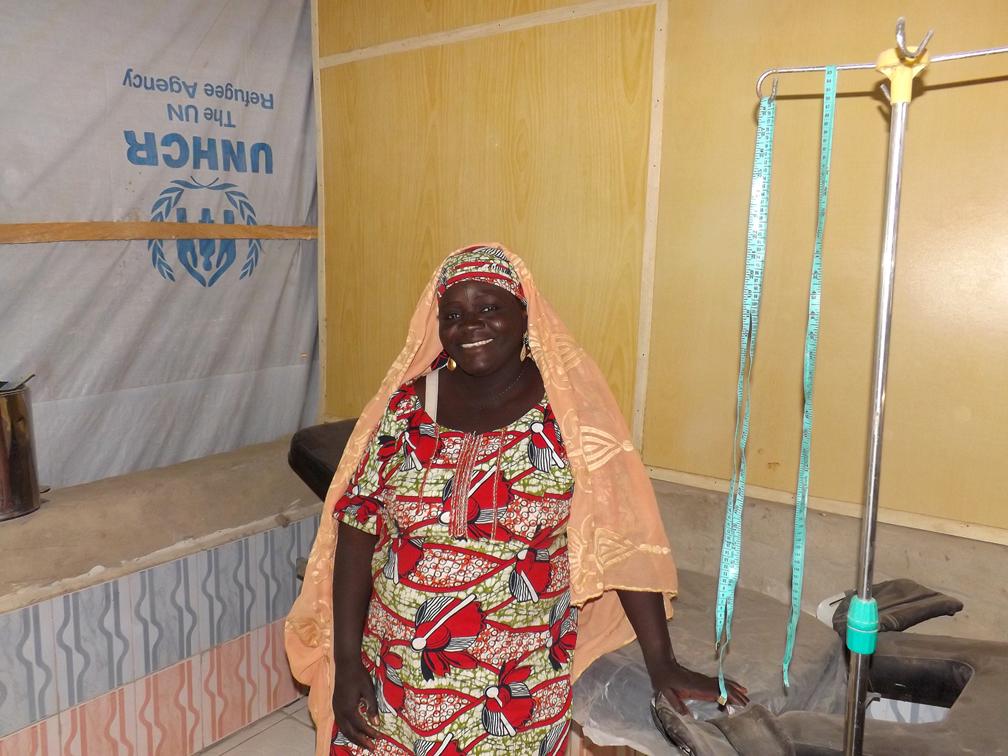
Awa poses in the small maternity room in the refugee camp. The facilities are minimal with only one delivery bed, some basic first aid equipment and plastic sheeting for walls. © UNHCR / Louise Donavan
“I was already assisting girls with giving birth in their homes in my village in Nigeria’s Borno State. There was nobody else to help them. I will always remember a midwife who helped me in one of my most difficult pregnancies. I want to provide the same comfort to other girls and young women”. The vast majority of those she has assisted over the past 20 years have been girls under the age of 18, often terrified and unprepared for giving birth.
“At 14 or 15 years old, the body is not ready, many pregnancies have terrible complications”
“When girls get married as children, they always end up getting pregnant quickly – they have no choice in the matter,” says Awa. “As wives, they are expected to obey their husbands, but they have no time to grow up themselves. At 14 or 15 years old, the body is not ready, many pregnancies have terrible complications”.
Early pregnancy often results in complications and may cause irreparable damage to the reproductive systems of girls and young women. Nigeria has the highest prevalence of obstetric fistula on the continent with over 80,000 cases per year. Other traditional practices, such as female genital mutilation can contribute to complications during child birth. Awa’s own traumatic experience giving birth as a teenager changed her life, and has inspired her to assist many young mothers in her village and in the refugee camp. An incredibly resilient woman, Awa has given birth to 12 children. “Three died of illnesses,” she says, her smile turning somber.
According to Girls not Brides*, Niger has the highest rate of child marriage in the world, with 75% of girls married before the age of 18 and 89% in the Diffa region. Under current law, girls can marry from 15, but many marry much younger. Poverty, lack of education and harmful traditional practices and beliefs are key factors. Niger ranks last in the Human Development Index.
In the Diffa region, which hosts more than 240,000 people forced to flee their homes, including 100,000 Nigerian refugees, UNHCR works directly with refugee communities to raise awareness, among other things, of their rights. This approach provides an opportunity to tackle sensitive issues such as child marriage through dialogue in the community. Through awareness and education, as well as the help of strong role models such as Awa, gradual change seems possible. When asked about her daughters, who are now 14 and 16 years old, Awa strongly insists that they will not be marrying before at least the age of 20.
“We are all sisters”
Although much remains to be done, a gradual shift on child marriages is expected. In 2014, Niger launched the regional African Union Campaign to End Child Marriage**. Other positive initiatives are on-going, including legislative amendments to raise the age of marriage to 18, which are currently under review. Working towards the education, empowerment and equality of women and girls are priorities in all humanitarian and development actions, as well as in government strategies and national legislation in Niger. As a signatory to the 1951 Refugee Convention, as well as the Convention on the Rights of the Child and the Convention on the Eradication of Discrimination Against Women, Niger is ready to engage in more meaningful efforts to abide by international obligations.
At the end of a long day at the health centre, Awa gets ready to return to her home in the refugee camp, exhausted but smiling. She will prepare the evening meal for her family. “At the end of the day, we must help one another. Women – we are all the same, we are all sisters ”.
*A global partnership of over 700 civil society organizations working towards ending Child Marriage – http://www.girlsnotbrides.org/
**For more information on the African Union Campaign to End Child Marriage: http://endchildmarriagenow.org/
You can read more about how UNHCR works to support women here.
